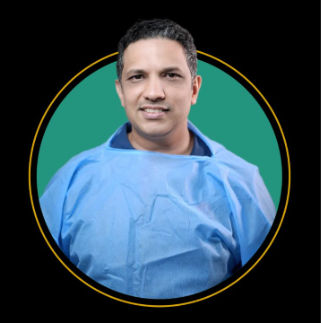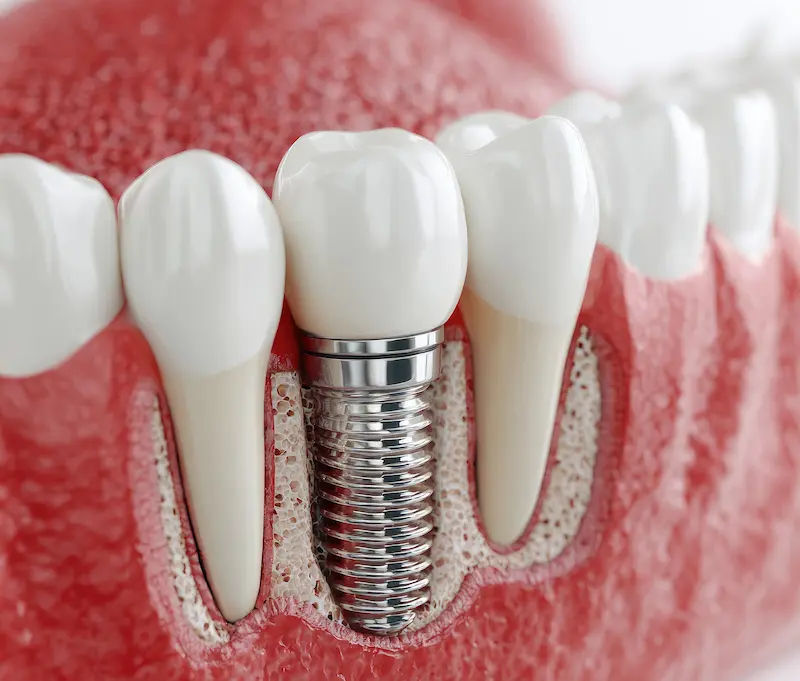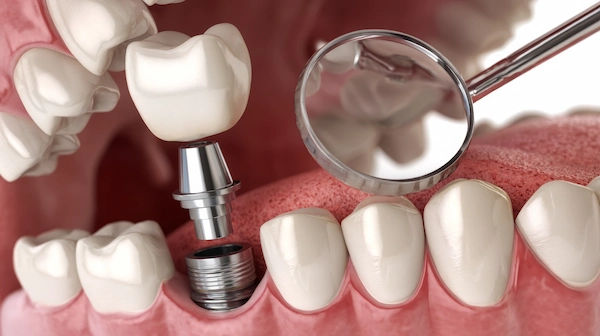Dental Implant Surgery: Types, Procedure, Risks, Success Rates, and More
Explore dental implant surgery, including types, procedure steps, potential risks, success rates, and factors affecting eligibility. Learn how implants provide long-term tooth restoration for a healthier smile with minimal complications.

Written by
Last updated on 3rd Jul, 2025
A dental implant is a surgical procedure that involves replacing the missing teeth with small threaded posts. These are implanted directly into the jawbone to support an artificial tooth that looks like a real one. This procedure may be an alternative in cases where there are insufficient tooth roots to hold up dentures or provide bridgework replacements.
Dental implants provide many benefits, such as improving oral hygiene, enhancing the dental look, and restoring teeth functionality. They provide support to adjacent teeth, mitigate bone loss, and ensure a long-term solution for lost teeth. This article is about dental implant surgeries, their types, risks, aftercare, success rates, and more.
Who Needs Dental Implants?
Here are the major signs that could signify that a person needs dental implant surgery:
Individuals having one or several missing teeth
Anyone whose tooth has become infected
Those who have loose partials or dentures
People having a sunken-in facial appearance due to multiple teeth loss
Anyone with a loose bridge
People with a cracked tooth or a broken tooth
Individuals with difficulty chewing foods
Factors Affecting Eligibility for Dental Implants
Following are the four factors that affect a person’s eligibility for dental implants:
Gum and Jawbone Health
Without a jawbone that is capable of a secure attachment through osseointegration for dental implants, the patient may need bone grafting. Poor gum health or periodontal disease can also hamper the implant's success and increase the possibility of infection.
Age and Facial Development
Since implants alter the bone structure of the jaw, they are not provided until the jaw has stopped growing, so most dentists refrain from performing the surgery on patients younger than 18. However, adults of any age can undergo dental implant surgery, provided their overall jaw is healthy.
Current Medications
Medicines like acetylsalicylic acid (aspirin) and nonsteroidal anti-inflammatory drugs (NSAIDs) affect anaesthesia, leading to excessive bleeding and other complications during surgery. Individuals should inform their dentist about their medication so that they can prepare well for the surgery using accurate pain management methods.
Other Risk Factors
Diabetes, osteoporosis, smoking and consuming alcohol increase the chances of complications with the implant.
What are the Types of Dental Implants?
Here are the three major types of dental implants:
Endosteal Implants
These implants are inserted directly into the jawbone, where it has to be attached to the denture. They appear like screws and require a healthy jawbone to allow the fusing of the implant into the bone. After the wound is healed, artificial teeth are fixed onto the implant, serving as a permanent solution.
Subperiosteal Implants
These implants are fitted on the surface of the jawbone underneath the gums. It is ideal for individuals with little bone mass. A metal frame with posts is put under the gums, and artificial teeth are attached to the posts.
Zygomatic Implants
These implants are placed into the cheekbone of people with a serious upper jawbone deficiency. They remove the need for bone grafting and provide a great way to replace lost teeth.
Consult Top Dentist
Procedure for Dental Implant Surgery
Dental implant surgery is a step-by-step process that involves inserting an implant into the jawbone to serve as a base for an artificial tooth. The steps are discussed below:
Step 1: Anesthesia
This procedure starts with providing some anaesthetic to numb the gums so that the individual feels pain-free and comfortable. The anaesthesia may vary depending on the case of the surgery.
Step 2: Making an Incision
After the area is numbed, a small cut is made into the gum by the surgeon to find the place in the bone where the implant will be made. Such an incision allows direct access to the jaw for subsequent steps.
Step 3: Drilling the Bone
The surgeon drills and makes a hole in the bone with the specialised drill machine. A small titanium post called a dental implant is placed here. The work is done with a lot of care so as to protect the surrounding areas in the mouth and prepare the area for the implant.
Step 4: Inserting the Implant
In that particular hole, the titanium implant goes into the jawbone, like the artificial root of the new tooth. The depth and angle of the implant have to be measured precisely to make sure it is put in the right place for the placement of the new tooth.
Step 5: Closing the Gums
Once the implant is in position, the gum tissue is closed over the site with stitches. In some cases, a healing cap or abutment may be placed on the implant prior to closing the gum. This allows it to stick through the gum tissue, providing an area to attach the replacement tooth.
Risks and Complications Associated with Dental Implant Surgery
It is common to experience some risks and complications after getting an implant. They can include:
Infection
Fractures in the jaw
Heavy bleeding
Slow healing of the jawbone
Nerve injury
Harm to nearby teeth
Damage to the sinuses
Tips for Effective Post-Operative Care After Dental Implant Surgery
Here are the major post-operative care tips that individuals must follow after undergoing dental implant surgery:
People should not spit for 24 hours after surgery.
Individuals must avoid touching the operative area with their fingers.
During the first 48 hours, patients have to put ice packs on the side of their face for 20 minutes at a time, followed by a 10-minute break.
If patients feel mild pain or in case it worsens, they should take the medication as prescribed by the physician.
After surgery, individuals need to drink fluids as much as possible.
People need to avoid smoking for at least a week after the operation.
Heavy activities and exercise should be avoided for 3-4 days.
People should rinse with warm salt water after meals for a week to help clear away food particles from the surgical area.
After the operation, patients need to eat soft, easy-to-swallow foods and cool beverages.
Factors Affecting the Cost of Dental Implants
Some of the essential factors influencing the cost of dental implants include:
Number of Implants
Location of the tooth or teeth
Preliminary processes
Implant material
Dentist's reputation and expertise
Laboratory costs
Clinic location and facilities
What are the Success Rates of Dental Implants?
Generally, the success rate of dental implants is high, with most studies showing over 95% success rates. However, success results greatly depend on personal factors such as the patient's health, their ability to keep the mouth clean, and the dentist's skills.
List of Alternatives to Dental Implants
Here are the major alternatives to dental implants:
Fixed Bridges (Implant-Supported and Traditional)
Full Dentures
Partial Dentures
Same-Day Dentures
Root Canal Therapy and Crown
Mini Dental Implants
Orthodontics (Braces or Aligners) with Restorative Dentistry
Denture Stabilisation with Dental Implants
Maintaining Healthy Remaining Teeth
Conclusion
These days, dental implant surgery stands out as a reliable and effective solution for recovering one's smile after losing teeth. This brings along all the benefits, like improvement in oral function, natural appearance, self-confidence, and long-term durability.
The process requires careful planning, from the initial consultation to the final restoration, and carries some risks that can be minimised with proper care. With adequate attention, dental implants can offer lifelong benefits, enhancing both oral health and overall well-being.
Consult Top Dentist
Consult Top Dentist

Dr P Manamalli
Dentist
20 Years • BDS, MBA, FICD, Fellowship in LASER Dentistry
Chennai
Apollo Hospitals Greams Road, Chennai

Dr. Suman Bagathi
Dentist
10 Years • BDS, MDS
Chinagadila
Apollo Hospitals Health City Unit, Chinagadila
(25+ Patients)

Dr. Revathi Miglani
Dentist
19 Years • MDS, DNB
Chennai
Apollo Hospitals Greams Road, Chennai

Dr. Saket Miglani
Dentist
19 Years • MDS, FICD
Chennai
Apollo Hospitals Greams Road, Chennai
(75+ Patients)

Dr Gaurav Jain
Oral and Maxillofacial Surgeon
21 Years • BDS, MDS
Delhi
Apollo Hospitals Indraprastha, Delhi


